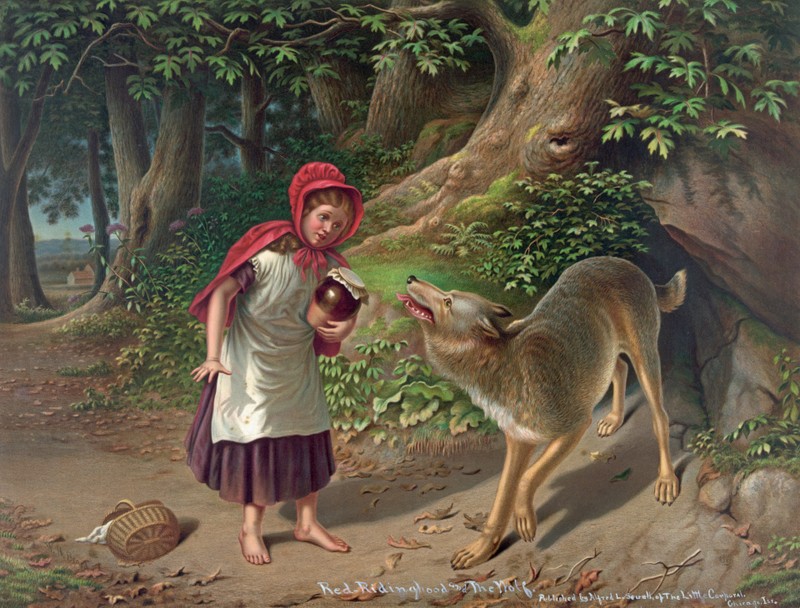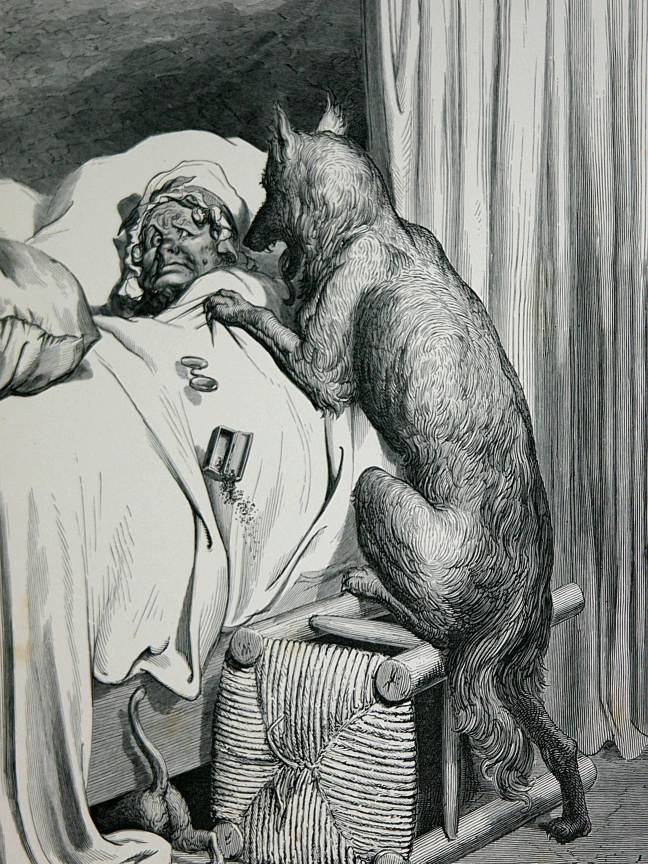Cappuccetto Rosso – Part 2. Posted by Geoff on Nov 22, 2017 in Italian Language
Here’s part 2. of Little Red Riding Hood. You can find part 1. HERE
Little Red Riding-Hood was not in a hurry, and there were many things to amuse her in the wood. She ran after the white and yellow butterflies that danced before her, and sometimes she caught one, but she always let it go again, for she never liked to hurt any creature.
Cappuccetto Rosso non aveva fretta, e c’erano tante cose che la divertivano nel bosco. Corse dietro le bianche e gialle farfalle che danzavano davanti a lei, e qualche volta ne catturava una, ma le rilasciava sempre, poiché mai voleva far male a qualche creatura.
And then there were the merry, cunning little squirrels to watch, cracking nuts on the branches of the old trees, and every now and then a rabbit would hurry away through the tall ferns, or a great bee come buzzing near her, and she would stop to watch it gathering honey from the flowers, and wild thyme. So she went on very slowly.
E poi c’erano i gioiosi, furbi piccoli scoiattoli da vedere, che schiacciavano noci sui rami dei vecchi alberi, e ogni tanto un coniglio correva via attraverso le alte felci, o una grande ape le veniva ronzando vicino, e lei si fermava a vederla cogliere miele dai fiori, e dal timo selvatico. Così procedeva molto lentamente.
By-and-by she saw Hugh, the woodman.
Non molto dopo vide Hugh, il boscaiolo.
“Where are you going, Little Red Riding-Hood,” said he, “all alone?”
“Dove vai, Cappuccetto Rosso,” disse lui,”tutta sola?”
“I am going to my grandmamma’s,” said the child. “Good day; I must make haste now, for it grows late.”
“Sto andando dalla nonna,”disse la bambina.”Buon giorno; devo fare in fretta ora, poiché sta diventando tardi”.
While Little Red Riding-Hood was at play in the wood, the great wolf galloped on as fast as he could to the old woman’s house. Grandmother lived all by herself, but once or twice a-day a neighbour’s child came to tidy her house and get her food.
Mentre Cappuccetto Rosso era a giocare nel bosco, il grosso lupo galoppava più veloce che poteva verso la casa della vecchia donna. La nonna viveva tutta sola, ma una volta o due al giorno il figlio di un vicino le veniva a pulire la casa e procurare il cibo.
Now, grandmother was very feeble, and often kept her bed; and it happened that she was in bed the day that Little Red Riding-Hood went to see her. When the wolf reached the cottage door he tapped.
Ora, la nonna era molto debole, e spesso rimaneva a letto; e accadde che era a letto il giorno che Cappuccetto Rosso andò a trovarla. Quando il lupo arrivò alla porta del cottage bussò piano.
“Who is there?” asked the old dame.
“Chi è là?” chiese la vecchia donna.
“Little Red Riding-Hood, granny,” said the wolf, trying to speak like the child.
“Cappuccetto Rosso, nonnina,” disse il lupo, cercando di parlare come la bambina.
“Come in, my dear,” said the old lady, who was a little deaf. “Pull the string and the latch will come up.”
“Entra, mia cara,” disse la vecchia, che era un po’ sorda. “Tira la corda e il saliscendi salirà.”
The wolf did as she told him, went in, and you may think how frightened poor grandmother was when she saw him standing by her bed instead of Little Red Riding-Hood.
Il lupo fece come lei gli disse, entrò, e puoi immaginare quanto fosse impaurita la nonna quando lo vide in piedi vicino al letto invece di Cappuccetto Rosso.
Very soon the wolf, who was quite hungry after his run, ate up poor grandmother.
Molto presto il lupo, che era davvero affamato dopo la corsa, mangiò la povera nonna.
Indeed, she was not enough for his breakfast, and so he thought he would like to eat sweet Red Riding-Hood also. Therefore he dressed himself in granny’s nightcap and got into bed, and waited for the child to knock at the door. But he waited a long time.
Infatti, lei non era abbastanza per la sua colazione, e così pensò che gli sarebbe piaciuto mangiare anche la dolce Cappuccetto Rosso. Quindi indossò il berretto da notte della nonna e andò a letto, e aspettò che la bambina bussasse alla porta. Ma aspettò a lungo.
End of part 2.

Build vocabulary, practice pronunciation, and more with Transparent Language Online. Available anytime, anywhere, on any device.






Comments:
Tony Sannella:
I wish you would reverse the order of the Italian and English so that you would see the Italian first. This way you would not have to avert your eyes till you scroll down below the English.
Geoff:
@Tony Sannella Salve Tony,
If you read my intro to part 1. of Cappuccetto Rosso you’ll see that the whole point of this exercise was to translate from English into Italian, hence reversing the order would make no sense.
The ability to translate from English into Italian is a vital skill set for you as a learner. Therefore I suggest that instead of trying to ‘avert your eyes’ you have a go at doing your own translation of the English text, which you can then compare with the version that I’ve given you.
Saluti
Debbie:
Great practice for translation !
Grammatically should colours go after noun eg farfalle bianche e gialle?
Also “for his breakfast” no need for the pronoun sua but say la colazione?
Can you please qualify
Geoff:
@Debbie Salve Debbie! Sono contenta che l’esercizio ti sia piaciuto.
Grammatically colours should go after the noun, however this is ‘una licenza poetica’ which gives it that musicality like a nursery rhyme, typical of fairy tales.
As for ‘his breakfast’ the traditional translation is ‘colazione’ without the article and the personal pronoun. Here the presence of both makes it ye olde style!
Saluti da Serena
John:
Molto utile, Geoff. Una bellissima idea. Possiamo avere di più dopo questa favola?
Geoff:
@John Certo! Poi, Vincenza ha già scritto delle favole sue in Italiano che vogliamo eventualmente tradurre in Inglese, ti va bene?
A presto, Geoff 🙂